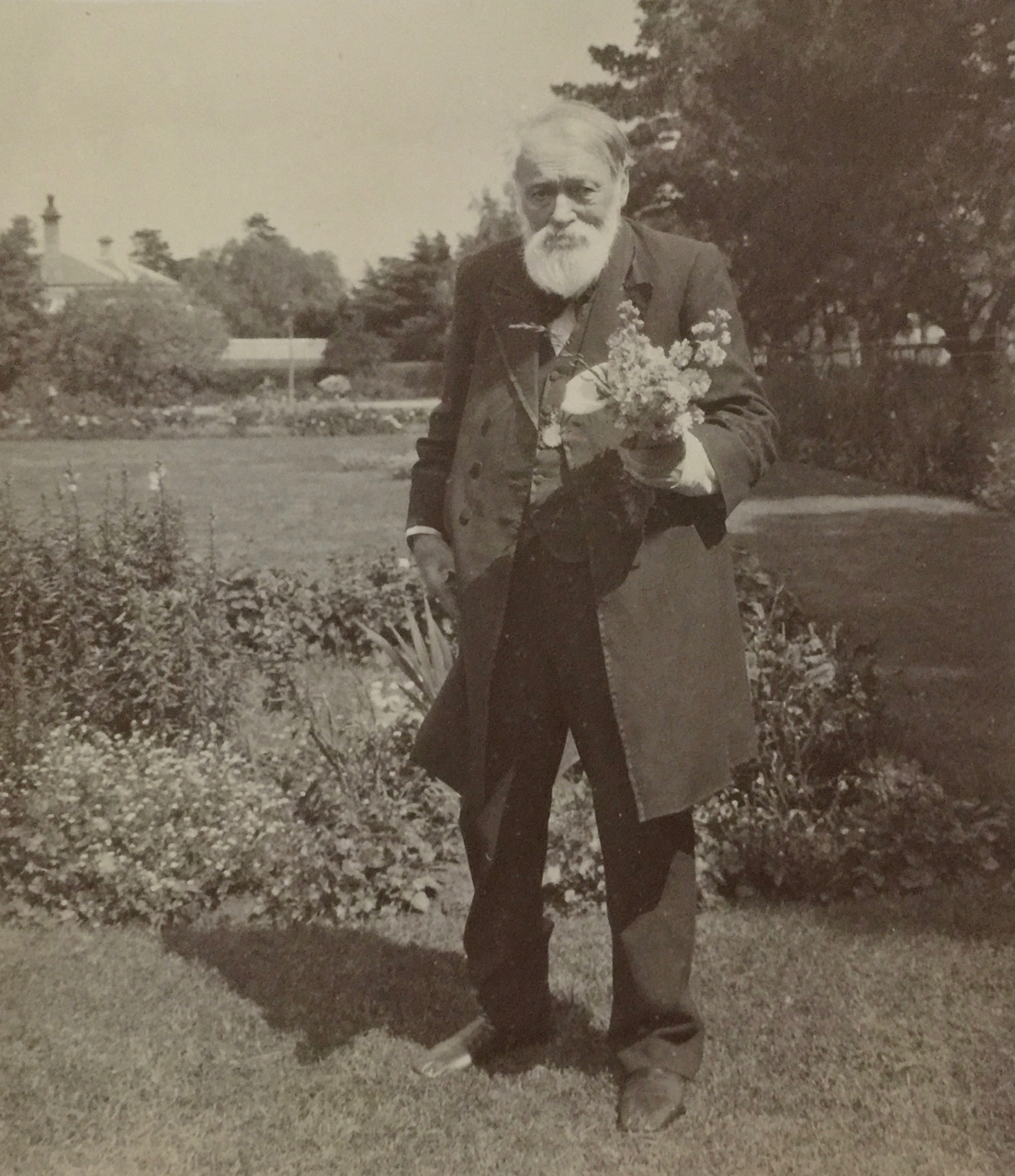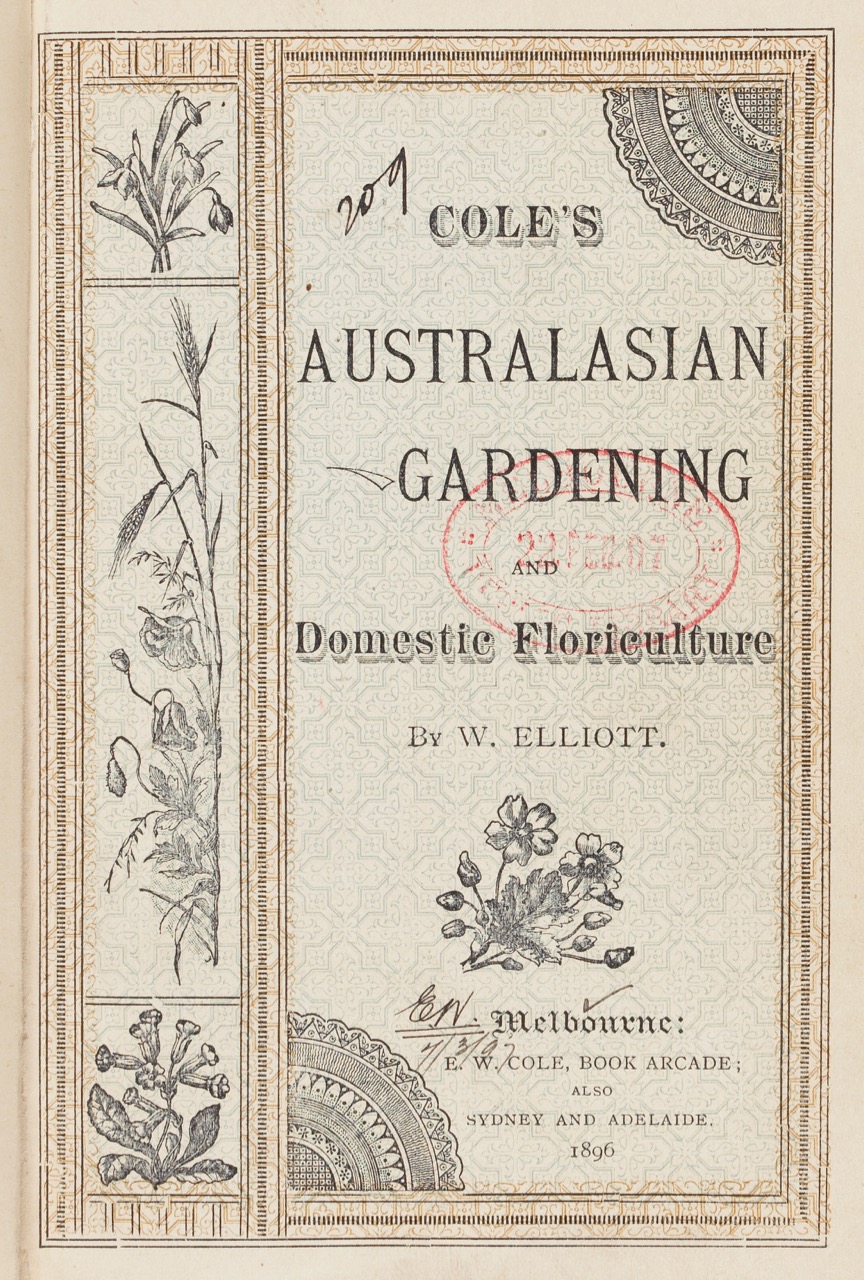The image at left of Cole’s Australasian Gardening and Domestic Floriculture bears Cole’s name on the cover, but was in fact an imprinted book with no original Cole material included. [It was selected for use here purely for its aesthetic appeal!] Greater detail of the imprinting process can be seen on the Publications/Overview page. The same imprinting principle also applies to Cole’s Penny Garden Guide which the NLA has digitised (nla.obj-390954513) and the 25 page, 5MB file can be accessed here.
There is one publication known to contain Cole’s personal input which is The Garden Lovers Book of Gems: The Happifying Gardening Hobby. This is available as a 10MB 245 page .pdf here. Cole also reproduced the same material in his Cosmopolitan Reasoner on pages 248-254 and the 19MB 7 page .pdf is available here.
In 2003, Ken Duxbury wrote a two-part article entitled With Mirrors and Rainbows which appeared in sequential issues of the journal of the Australian Garden History Society. These are Australian Garden History, Vol. 14 No. 6, May/June, 2003 and Vol. 15 No 1, July/August, 2003. These can be viewed or purchased at the Australian Garden History Society website. The introduction says In a two-part article Ken Duxbury discovers that among the many intriguing characteristics of a man who personified the individualism and entrepreneurial spirit of ‘Marvellous Melbourne’ was a love of flowers and gardens.
Cole starts The Happifying Gardening Hobby as follows:
Friendly reader, I have not written a preface to this book inasmuch as prefaces are often not read, and I wish you to read from the beginning. It consists mainly of 200 pieces and poems in praise of gardening and flowers, most of them eloquently and forcibly written by the good and the great, including philosophers, divines, princes, judges, statesmen, writers, scientists, philanthropists, and other eminent personages who have seen and felt the great value of the gardening hobby to mankind, morally, physically and socially. Gardening is one of the best hobbies we have, for it brings knowledge, and health, and happiness in many ways.
IT EDUCATES US; for the planning, and planting, and looking after a garden interests us and makes us observe and think, and thus we acquire knowledge.
IT BRINGS US HEALTH IN A MOST SATISFACTORY MANNER. We can work as easily or as hard as we choose to do it, and gain pleasure for ourselves and friends, and otherwise profit from the operation. It is as good an exercise for the health as general gymnastics, and gives more lasting satisfaction; and it gives us all this pleasant exercise and recreation close to our home, and turns it to profitable account in the very act of beautifying that home.
FLOWERS BRING REFINED PLEASURE AND CONSEQUENTLY HAPPINESS. Henry Ward Beecher says: “Flowers are the sweetest thing God ever made and forgot to put a soul into.” Flowers smell the sweetest and look the loveliest of all earthly things, and most men and women throughout the world dearly love them; and the cherished wish of nearly all mankind is to go to a world beyond the grave “Where everlasting spring abides and never-withering flowers.” We cannot conceive of a perfect heaven without beautiful flowers, beautiful sights, and beautiful music.
FLOWERS BRING HAPPINESS IN OTHER WAYS. They bring solace to the sick, beautify the house, adorn the hall and the altar, and deck the bride and the grave…
… When we plant a garden we become interested in and attached to each flower and plant, almost as much as we do pet animals; we watch their growth day by day; when lonely we find solace and almost a species of companionship in our flowers; when we go on a long journey we think of them, and when we return we go look at them as old friends, and mark their progress with pleasure. A child who likes flowers and is brought up in a home with a flower-garden attached, can never forget it as long as he or she lives; they will always remember it as a pleasant home.
When I was a child my grandmother, who loved flowers dearly, had a beautiful garden with an immense variety; and although sixty years have intervened, I can remember almost every kind of flower in it. [Cole’s paternal grandmother was unknown and his maternal grandmother died 22 years before Cole was born, so she must have been Sarah Watson, the mother of Cole’s stepfather, Thomas Watson.]
I also remember that when a child of six years old, I was delighted to find some French Marigolds growing in the small garden of a new house which we had moved into; the delight which the practical possession of that little group of flowers gave me I have not forgotten and probably never shall forget.
I love flowers, but circumstances have always prevented me from indulging in a garden; yet whenever I go into a new country I always make for the woods and gullies and mountains to admire and gather wild flowers. Four of the best flower countries in the world, each of which has been called “The Land of the Flowers”, are Japan, Brazil, the Sandwich Islands and Cape Colony. I once lived in the last named, and many a time I have wandered by myself among the karoo and kloofs and mountains to admire and gather wild flowers. Cape Colony, dry and thorny as it is, in variety is like a botanical garden; I have stood in one spot and seen thirty or forty different plants around me.

The 85 year-old Cole finally had his own garden and is shown here holding a posy of flowers from the garden at the family home ‘Earlesbrae’ in Essendon. The photograph was taken by Cole’s son-in-law, Rupert Rudd on 9 October, 1917.
Rupert Rudd collection.

